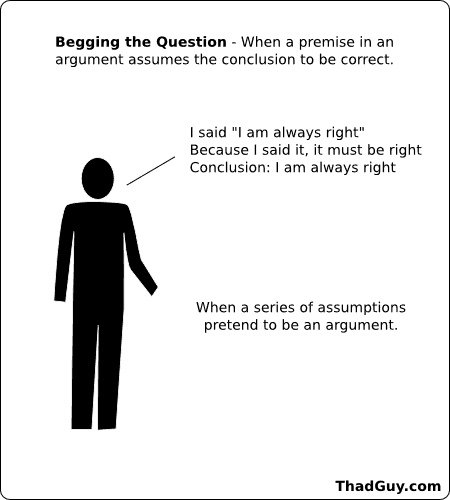 What does it mean to “beg the question?” The phrase often appears where something like “raise the question” would be more appropriate, e.g. “Her jittery movements and obvious lack of focus begs the question of just how much cotton candy she has eaten today.” Really, it would be better to say this “raises” a question, because “begging the question” has a specific meaning among people who enjoy discussing logic (not that I hang out with people like that…)
What does it mean to “beg the question?” The phrase often appears where something like “raise the question” would be more appropriate, e.g. “Her jittery movements and obvious lack of focus begs the question of just how much cotton candy she has eaten today.” Really, it would be better to say this “raises” a question, because “begging the question” has a specific meaning among people who enjoy discussing logic (not that I hang out with people like that…)
To “beg the question” is to make an argument in which you have already assumed the truth of what you are trying to prove (see also circular reasoning). To use Wikipedia’s definition (which may bring up all new fallacies, but shut up), “begging the question” is:
a type of logical fallacy in which a proposition relies on an implicit premise within itself to establish the truth of that same proposition. In other words, it is a statement that refers to its own assertion to prove the assertion. Such arguments are essentially of the form “a is true because a is true” though rarely is such an argument stated as such. Often the premise ‘a’ is only one of many premises that go into proving that ‘a’ is true as a conclusion.
To give a few examples, via The Skeptic’s Dictionary:
The following argument begs the question.
We know a god exists because we can see the perfect order of creation, an order which demonstrates supernatural intelligence in its design.
The conclusion of this argument is that a god exists. The premise assumes a creator and designer of the universe exists, i.e., that a god exists. In this argument, the arguer should not be granted the assumption that the universe exhibits intelligent design, but should be made to provide support for that claim.
***
The following is another example of begging the question.
Paranormal phenomena exist because I have had experiences that can only be described as paranormal.
The conclusion of this argument is that paranormal phenomena exist. The premise assumes that the arguer has had paranormal experiences, and therefore assumes that paranormal experiences exist. The arguer should not be granted the assumption that his experiences were paranormal, but should be made to provide support for this claim.
I think the origin of the phrase comes from the idea that assuming the very premise you are trying to prove only draws out your argument, but again, let’s ask Wikipedia:
The term was translated into English from Latin in the 16th century. The Latin version, petitio principii, can be interpreted in different ways. Petitio (from peto), in the post-classical context in which the phrase arose, means “assuming” or “postulating,” but in the older classical sense means “petition,” “request,” or “beseeching.” Principii, genitive of principium, means “beginning,” “basis,” or “premise” (of an argument). Literally petitio principii means “assuming the premise” or “assuming the original point,” or, alternately, “a request for the beginning or premise;” that is, the premise depends on the truth of the very matter in question. [Internal citations omitted]
If you say or do something that causes people to have even more questions about whatever you said or did, then you are “raising” questions. You are only “begging” a question when you say something like “People find me attractive because I am so good-looking.”
There is a whole website devoted to exploring the use of this term, if you would like to know more.
Photo credit: ‘Begging the Question’ © ThadGuy.com, used with permission.

